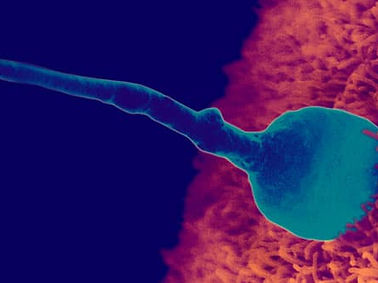Fetal Development
With photos from webmd.com

Conception
Fertilization happens when a sperm meets and penetrates an egg. It's also called conception. At this moment, the genetic makeup is complete, including the sex of the baby. Within about three days after conception, the fertilized egg is dividing very fast into many cells. It passes through the fallopian tube into the uterus, where it attaches to the uterine wall. The placenta, which will nourish the baby, also starts to form.
8 Weeks
The baby is now a little over half an inch in size. Eyelids and ears are forming, and you can see the tip of the nose. The arms and legs are well formed. The fingers and toes grow longer and more distinct.


16 Weeks
The baby now measures about 4.3 to 4.6 inches and weighs about 3.5 ounces. You should be able to feel the top of your uterus about 3 inches below your belly button. The baby's eyes can blink and the heart and blood vessels are fully formed. The baby's fingers and toes have fingerprints.
28 Weeks
The baby weighs about 2 pounds, 6 ounces, and changes position often at this point in pregnancy. If you had to deliver prematurely now, there is a good chance the baby would survive. Ask your doctor about preterm labor warning signs. Now is the time to register for birthing classes. Birthing classes prepare you for many aspects of childbirth, including labor and delivery and taking care of your newborn.


36 Weeks
Babies differ in size, depending on many factors, such as gender, the number of babies being carried, and size of the parents. So your baby's overall rate of growth is as important as the actual size. On average, a baby at this stage is about 18.5 inches and weighs close to 6 pounds. The brain has been developing rapidly. Lungs are nearly fully developed. The head is usually positioned down into the pelvis by now. Your baby is considered at 'term' when they are 37 weeks. They are an early term baby if born between 37-39 weeks, at term if born between 39-40 weeks and late term if born between 41-42 weeks.
Birth!
A mother's due date marks the end of their 40th week. The delivery date was calculated using the first day of their last period. The baby may not arrive exactly on that date which is why regular medical care is important. Your labor may start naturally or your doctor may induce your labor. Ultimately, every woman and every situation is unique. Communicating with your medical team and understanding the labor process is the best way to prepare yourself for this special event.

